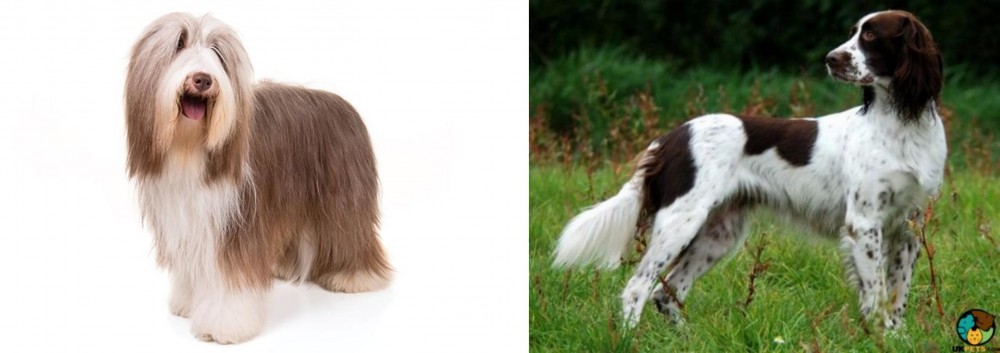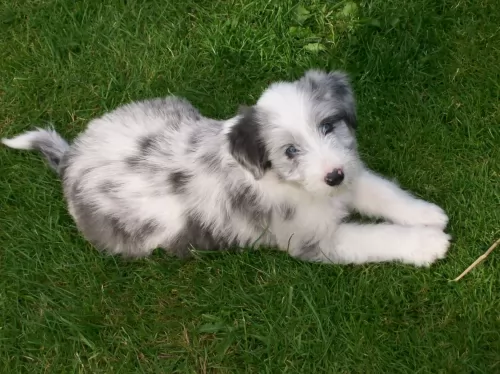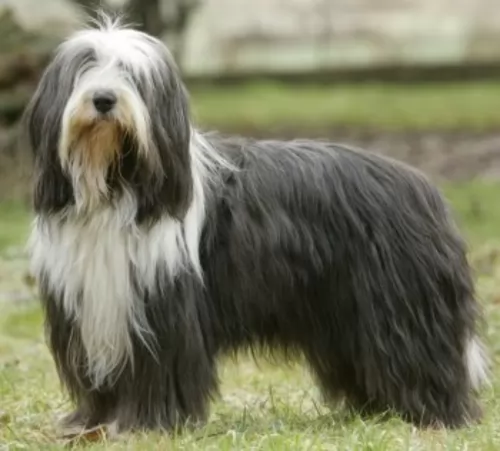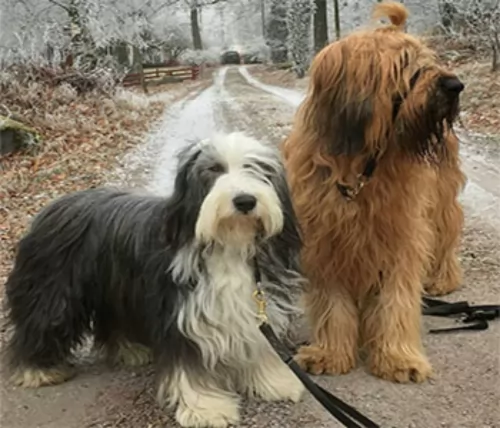 Petzlover
Petzlover Bearded Collie is originated from United Kingdom but French Spaniel is originated from France. Bearded Collie may grow 8 cm / 3 inches shorter than French Spaniel. Both Bearded Collie and French Spaniel are having almost same weight. Bearded Collie may live 3 years more than French Spaniel. Both Bearded Collie and French Spaniel has same litter size. Bearded Collie requires High Maintenance. But French Spaniel requires Moderate Maintenance
Bearded Collie is originated from United Kingdom but French Spaniel is originated from France. Bearded Collie may grow 8 cm / 3 inches shorter than French Spaniel. Both Bearded Collie and French Spaniel are having almost same weight. Bearded Collie may live 3 years more than French Spaniel. Both Bearded Collie and French Spaniel has same litter size. Bearded Collie requires High Maintenance. But French Spaniel requires Moderate Maintenance
 This long-haired herding breed was bred by mixing the two sheepdog breeds: the Scottish dogs and the Polish sheepdogs. The Bearded Collie gained the popularity during the last century by winning some of the Dog Shows. This friendly dog with the beautiful coat is surely one of the most specific pets. Nowadays, the Bearded Collie is very popular. The organizations for breeding, saving, rescuing and adopting this breed can be found in the USA.
This long-haired herding breed was bred by mixing the two sheepdog breeds: the Scottish dogs and the Polish sheepdogs. The Bearded Collie gained the popularity during the last century by winning some of the Dog Shows. This friendly dog with the beautiful coat is surely one of the most specific pets. Nowadays, the Bearded Collie is very popular. The organizations for breeding, saving, rescuing and adopting this breed can be found in the USA.
 Developed in France and then in Canada, the French Spaniel is a descendent of 14th century hunting dogs. Originally the breed was very popular with the French royalty and nobility at the Court of Versailles, in the Middle Ages. A French Spaniel named Babe was owned by Catherine I of Russia.
Developed in France and then in Canada, the French Spaniel is a descendent of 14th century hunting dogs. Originally the breed was very popular with the French royalty and nobility at the Court of Versailles, in the Middle Ages. A French Spaniel named Babe was owned by Catherine I of Russia.
Spaniels were mentioned in Gaston III of Foix-Beams’ The Master of the Game, or Livre de Chasse, in 14th Century France. Most believed that Spaniels had been developed during the 11th century Crusades. By 1650 the French Spaniel was differentiated from the King Charles Spaniel and determined to be its own type of spaniel.
In 1805, they were featured in the Sporting Magazine, hunting mallards. The French Spaniel was crossed with English Setters in the !850’s to develop the French Brittany (Spaniel). But by the end of the 19th century, hunting dogs from other countries were outpacing the French Spaniel so much that it was driven to the brink of extinction. Fortunately, a priest named Father Fournier saved the breed by taking all remaining Spaniels to his kennels at St. Hillarie and developing the lines we see in the breed today. This was followed by the founding of the French Spaniel Club in 1921. The various lines of the Spaniels included the French Spaniel of today, the Brittany of today, the Blue Picardy and the Picardy.
The French Spaniel however has been rare outside of its native country and Canada, where it was imported in the 1970’s to French speaking Quebec. Quebec Canadians fell in love with the breed for hunting grouse and woodcock. In order to ensure that the breed would be continued in line with its French standards, the Club de l’Epagneul Francais du Canada began in 1978. By 1985 the Canadian Kennel Club recognized the French Spaniel. Soon after they were recognized by the United Kennel Club, the Federation Cynoloqique Internationale, the UK Kennel Club and the North American Versatile Hunting Dog Association, but not the AKC (American Kennel Club). They are also registered with organizations such as the American Canine Association, the Dog Registry of America and the America’s Pet Registry. They have been included in the AKC Foundation Stock Service as the first step toward AKC recognition.
 The Beardie is easy to recognize because of the longer hairs on the cheeks, chin and under the lower lip. This medium-sized Bouncing Beardie is usually the great family pet because he is very friendly and loving. This breed is extremely active and they are energetic despite their longer bodies. They grow up to have more than one coat colour, but they are all born one coloured. They always have white or cream markings. This smart dog can be very stubborn and independent, if you keep your dog in a yard, he will use every chance to escape.
The Beardie is easy to recognize because of the longer hairs on the cheeks, chin and under the lower lip. This medium-sized Bouncing Beardie is usually the great family pet because he is very friendly and loving. This breed is extremely active and they are energetic despite their longer bodies. They grow up to have more than one coat colour, but they are all born one coloured. They always have white or cream markings. This smart dog can be very stubborn and independent, if you keep your dog in a yard, he will use every chance to escape.
 The French Spaniel is a very tall dog and as such is one of the spaniel breeds two tallest. They are taller than the English Springer Spaniel, have a deep chest and a muscular build. Their legs are very strong, and they have a thick tail that is never docked. It is long, slightly curved and hangs low. He is an elegant dog with dark amber eyes, long feathery ears, and a nose the color of the coat. If the coat is brown the nose is brown. If the coat is black and white the nose is black. Most French Spaniels are white with brown or dark liver or white with black.
The French Spaniel is a very tall dog and as such is one of the spaniel breeds two tallest. They are taller than the English Springer Spaniel, have a deep chest and a muscular build. Their legs are very strong, and they have a thick tail that is never docked. It is long, slightly curved and hangs low. He is an elegant dog with dark amber eyes, long feathery ears, and a nose the color of the coat. If the coat is brown the nose is brown. If the coat is black and white the nose is black. Most French Spaniels are white with brown or dark liver or white with black.
 The Bouncing Beardie is great with children. They are very playful, jumpy and have generally very sweet and gentle personality. Children love them because they never get tired. If properly socialized, this dog can be the main attraction for any child.
The Bouncing Beardie is great with children. They are very playful, jumpy and have generally very sweet and gentle personality. Children love them because they never get tired. If properly socialized, this dog can be the main attraction for any child.
Herding, agility shows, obedience competitions, treibball, show dogs, trally...
This breed is very friendly. If your family is about to raise the Bearded Collie, prepare to have a pet that is highly affectionate and bonded with the members of the family. They don’t do well if left alone. They usually don’t bark and they are never destructible, but loneliness somehow triggers odd behaviour with this breed. They are not usually scared of strangers. If they are trained and socialized, you will be able to take your Beardie anywhere you go.
Some say that is very easy to train the Bearded Collie. The rule for this breed is to start the obedience training while they are very small. They are generally very independent, and they will try to do things in their own way. If you start your training early before your Beardie forms this kind of personality, you will have a wonderful pet.
 This breed is generally very healthy. They don’t have some major health issues. Some of the issues that are registered are:
This breed is generally very healthy. They don’t have some major health issues. Some of the issues that are registered are:
The degenerative disease that causes the blindness.
When the hormone produced by the thyroid gland is abnormally low.
That is generally the hereditary disease, can also be caused by bad diet or injuries.
To food, chemicals, pollen, dust...
That usually happens because of their dropped ears that are not very easy to clean.
 The French Spaniel is a healthy breed that adapts well to all types of conditions, especially wet ones. There are some potentially serious health issues that the breed may be susceptible to:
The French Spaniel is a healthy breed that adapts well to all types of conditions, especially wet ones. There are some potentially serious health issues that the breed may be susceptible to:
This is a very serious inherited disorder. It is one of many Hereditary Sensory Autonomic Neuropathies (HSN) disorders. This is an agonizing infliction that causes the dogs to have no pain in certain extremities and therefore the ability to self-mutilate their feet, pads, claws and digits. They lick and bite their feet often amputating footpads, claws, and digits without feeling any pain. This leads to infection and most dogs end up being euthanized. The disorder shows up by 3-4 months of age.
Make sure the dog’s ears are cleaned regularly to remove wax and prevent infections.
This disease causes seizures but can be treated with medication.
Can cause lameness and arthritis.
 Raising your Bearded Collie pup on a high-quality food is usually enough for a puppy. Make sure that portions are appropriate for his age and weight. Once your pet is more than six months old, they will need only two meals per day. They get obese very easy. Don’t train them with the treats.
Raising your Bearded Collie pup on a high-quality food is usually enough for a puppy. Make sure that portions are appropriate for his age and weight. Once your pet is more than six months old, they will need only two meals per day. They get obese very easy. Don’t train them with the treats.
To care for your Bearded Collie, you must be aware of the grooming responsibilities that come with this longhaired pet. During the shedding period, it is required to brush them daily. Bathing is not a regular necessity but it will be easier to keep him clean and well groomed if you care about your pet all the time. Some people like to shorten the coat for their Beardie, and it is usually done during summer. Make sure to take him to regular ear, eye, teeth and hip vet checks.
The Bearded Collie is a breed that requires daily activity. They have very playful nature and they love to run, play and spend time outdoors. The best option will be a big yard so that Beardie can run for hours without the leash.
 A high quality dry food made for puppies and if possible for Spaniels. Feed two to three times a day about one fourth of a cup each time
A high quality dry food made for puppies and if possible for Spaniels. Feed two to three times a day about one fourth of a cup each time
A high quality adult dry food made for Spaniels if possible. Feed twice a day about one half to three fourths of a cup at each meal.
Excellent vision, stamina and speed.
These dog love to run and play. They are smart and learn easily. They like to chase balls, swim, play hide and seek, Find It, and go hiking. They can excel at learning tricks, agility, rally and obedience trials.